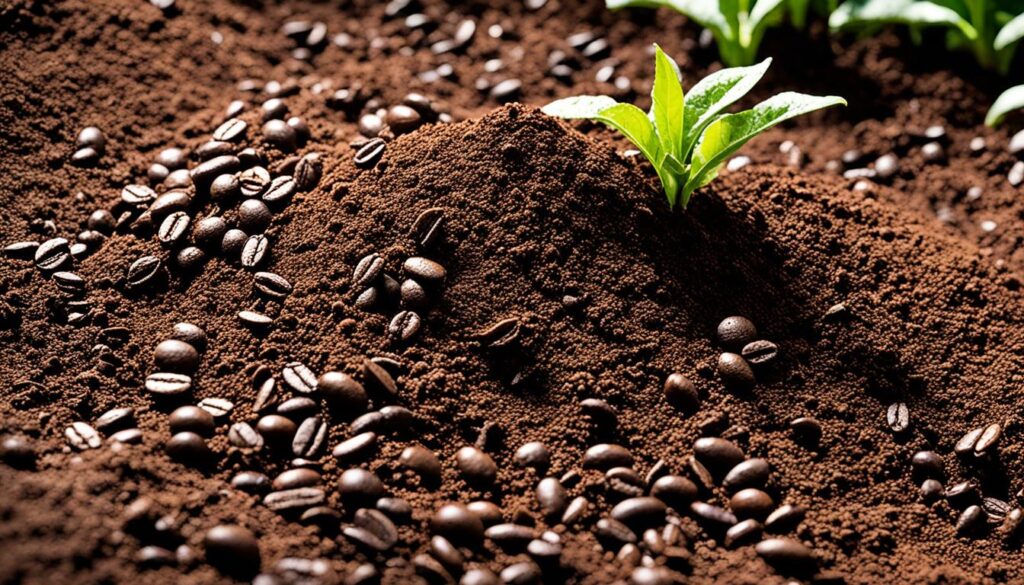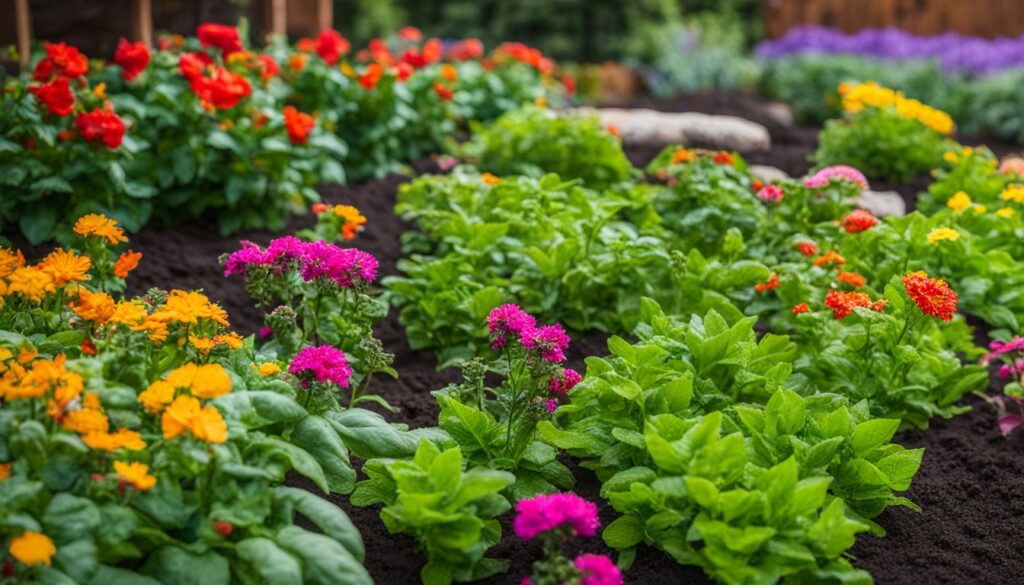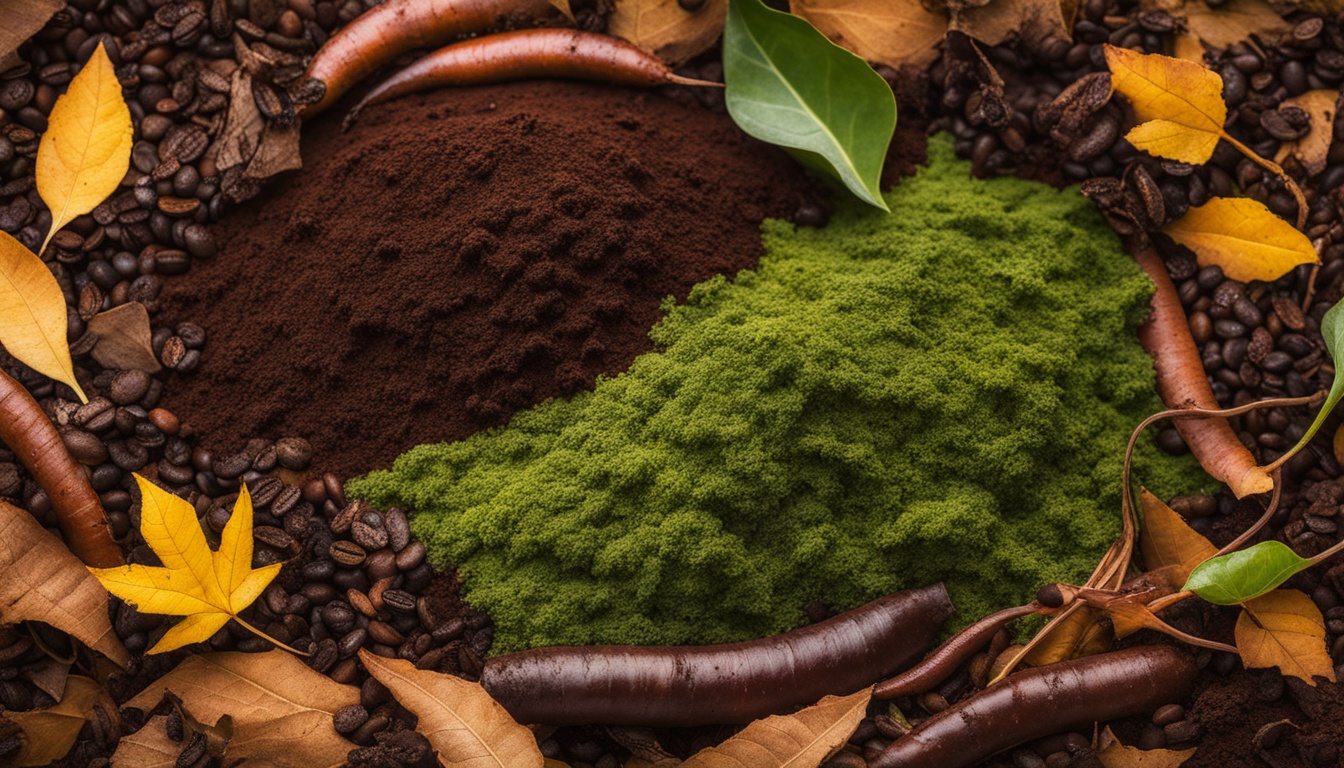Coffee grounds are great for gardens. They are a byproduct of drinking coffee, bringing nutrients like nitrogen, phosphorus, and potassium. These are good for plants and make the soil better.
But, before you add them, think about your plants’ soil needs. Most plants like soil that is a bit sour, with a pH between 6.0 and 7.0. Yet, some need special pH levels.
For example, azaleas, hydrangeas, and blueberries thrive in soil below 7.0. They love coffee grounds’ acidity. But ferns and asparagus do better in soil around 7.0. And plants liking more alkaline soil won’t enjoy coffee grounds.
Don’t go overboard with the coffee grounds. Fresh ones can be very acidic. Use them a little or compost them first to help young plants grow without problems.
Remember these points for adding coffee grounds in your garden:
- Check what pH your plants like before using coffee grounds.
- Use fresh coffee grounds sparingly to not hurt your plants.
- Mix in composted grounds to boost your soil’s health.
- Don’t use too many grounds at once to avoid water problems.
- You can also make liquid plant food by soaking grounds in water.
- Coffee grounds help keep some pests away, like slugs and ants.
Always be careful with how you use coffee grounds in gardening. Make sure they fit your plants’ needs well. This way, you can enjoy a healthy garden full of the benefits of coffee grounds.
Key Takeaways:
- Coffee grounds are good for the garden because they add nutrients and organic matter.
- Think about your plants’ soil pH needs before using grounds.
- Use coffee grounds carefully to not slow down plant growth.
- Composted coffee grounds make soil better and add more nutrients.
- Coffee grounds can stop some pests from bothering your plants.
Coffee Grounds in Compost
Coffee grounds are great for plants and perfect for your compost. They boost nutrients and organic matter, making the compost better for your garden. This improves the soil and helps plants grow strong.
When using coffee grounds in compost, remember to mix them well. Blend them with “brown” materials like dry leaves and newspapers in a 4-to-1 mix. This mix is great for healthy compost.
Composted coffee grounds do a lot for your garden. They make the soil better, holding more water and air. This helps plants by giving their roots the perfect mix of air and moisture they need.
Coffee grounds also add good microorganisms to the soil. These little helpers break down organic matter. They make nutrients available to plants, helping them grow well.
Not to mention, coffee grounds bring a lot of nitrogen to the compost. Nitrogen is a key nutrient for plants. It makes the soil more fertile and supports plant growth.
Once the compost is ready, use it as mulch or mix it into the soil. It’s a natural fertilizer that keeps the soil moist, fights weeds, and boosts plant growth and yield.
In the end, putting coffee grounds in your compost is a smart choice. It enriches the compost, making it great for your garden. You get a quality compost that helps your plants be healthy and strong.
Applying Coffee Grounds to Garden Soil
Coffee grounds help garden soil and make it better. But you need to know how to use them. Follow these tips when you put coffee grounds in your garden.
1. Application Methods
You can use two methods to apply coffee grounds in your garden. First, rake them into the top few inches of the soil. This spreads the nutrients to the plants’ root zone. You can also just sprinkle them on top and let them break down by themselves.
2. Avoid Thick Layers
Don’t use too many coffee grounds at once. A thick layer blocks water and air, hurting your soil. This could lead to too much water and root rot. Instead, use a thin layer so water and air can move easily.
3. Blend with Organic Materials
Mix coffee grounds with other organic materials to make soil better. You can add wood chips or dry leaves. This mix will help your plants grow strong roots.
4. Gradual Application
Add coffee grounds slowly to your soil. If you add a lot at once, it might stop water from soaking in. But if you add a little bit over time, your soil will get better without problems.

Using coffee grounds the right way can make your garden soil rich in nutrients. It’ll also be easy for air and water to get to your plants’ roots.
Other Uses for Coffee Grounds in the Garden
Besides being a natural fertilizer, coffee grounds work well in gardening. They have several cool uses:
Natural Pest Control

They keep pests like slugs, ants, and more away. These bugs don’t like the coffee’s strong smell. Using coffee grounds is a safe and planet-friendly way to protect your plants. But remember, how well it works can change with the pest or your garden.
Mushroom Cultivation
Oyster mushrooms love to grow in coffee grounds. The slight acidity is just right for them. You can grow your own mushrooms at home using old coffee grounds.
Soil pH Adjustment
If your garden needs more acidity, coffee grounds can help. You can use them for plants like azaleas and rhododendrons that prefer acidic soils. But plants that like neutral or alkaline soils won’t benefit from coffee grounds.
Worm Food
Worms love coffee grounds because they’re full of nutrients. Adding them to your garden feeds the worms. This boosts soil health and helps plants. You can put coffee grounds in your compost to feed worms or sprinkle them directly on your soil.
Coffee grounds are great in the garden. They keep some pests away, help grow mushrooms, adjust soil pH, and feed worms. But remember, don’t overdo it. Pay attention to your plants’ specific needs for the best outcomes.
Conclusion
Coffee grounds are great for gardens when used right. They add nutrients and improve soil. But, it’s important to know what your plants need. Using too much can be harmful.
Some plants don’t like coffee grounds. These include those that need acidic soil. However, plants such as lavender and yucca will love them. But, be careful with tomatoes. They need soil that is just a little acidic or neutral. Too much acidity from coffee grounds can hurt them.
If you use too many coffee grounds, your soil could become hard and too acidic. This isn’t good for plants. So, check your soil’s pH. Make sure you match your plants’ needs with the right amounts of coffee grounds. Also, consider composting them. This can make them even better for your soil. It helps with soil quality and plant growth.
So, use coffee grounds wisely in your garden. Consider your plants’ needs when using them. This way, you can make good use of your kitchen waste. Happy gardening!
